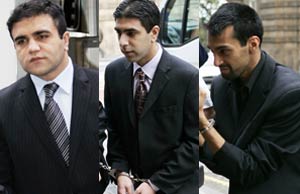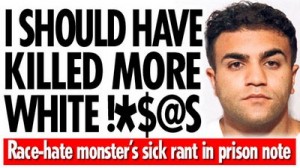Racism was once defined as "prejudice plus power" [ By whom? This is not just a lie; this is a cunning lie. Editor ] - a definition which, in a British context, has tended to exclude all but the white population. [ That is a BBC Propaganda lie - Editor ]
However, the "racist murders" of Kriss Donald in Glasgow in
2004 and Ross Parker in Peterborough in 2001, young white men killed by Asians,
demonstrate how society has been forced to redefine racism.


It was, of course, the murder of a young black man, Stephen Lawrence, which changed the debate about race crime in Britain.
The inquiry which followed redefined a racist incident as any "which is perceived to be racist by the victim or any other person". It is, therefore, a largely subjective crime - and one which has proved extremely difficult to prove beyond reasonable doubt.
The statistics reflect that subjectivity, but they also reflect a belief right across the spectrum in multicultural Britain, that people are attacked because of the colour of their skin.
Changing picture
Until the mid-nineties, the government's British Crime Survey only asked ethnic minority groups whether they had been the victim of a crime which was racially motivated. Since then, all victims are asked and the picture has changed dramatically.
The most recent analysis shows that in 2004, 87,000 people from black or minority ethnic communities (BME) said they had been a victim of a racially motivated crime. In the same period, 92,000 white people said they had also fallen victim.
Focusing on violent racial attacks, 49,000 BME were victims. Among whites, the number was 77,000.
|
|
|
Of those that involved wounding 4,000 were BME. Among the white population it was 20,000.
The numbers can be highly misleading, though. [ That is how the BBC like it - Editor ]. Since about 90% of people in Britain are white, the statistics actually show the risk of being a victim of race crime is significantly greater if you are from an ethnic minority.
According to the most recent Home Office analysis, the chances for a white person is less than 1%. For Black and Asian people it is put at about 1%.
Low risk
Taking into account the subjective nature of the statistics, it seems that the risks are relatively low across all communities.
Nevertheless, for the tens of thousands of white people affected by race crime, the issue is a real one.
The far right has tried to exploit what it claims is the untold story of racial attacks on white people. On the National Front website they feature a long list of "The Fallen", white people they say were killed by non-whites.
Often, however, the crimes have nothing to do with race and in a number of cases, for instance Ross Parker, relatives of the victims have objected to their names being used.
Trying to unravel the motivation behind a crime is always difficult. Was a kick or a punch in a violent robbery any harder because of the victim's skin colour?
Describing an incident as racist may say as much about a victim's mindset as the offender. How else can one explain the British Crime Survey finding that 3,100 car thefts from Asians were deemed to be racially motivated?
Most of the offenders (57%) in the racially motivated crimes identified in the British Crime Survey are not white. White victims said 82% of offenders were not white.
|
Ross Parker was killed in a racially motivated attack in 2001 |
Among black victims of race crime, a quarter of offenders were identified as not white. Among Asian victims, the non-white proportion rises to a third.
There has been in increase in recorded instances of race crime, but experts believe this is due to more people coming forward to report incidents and a greater willingness from the police to take accusations seriously.
The British Crime Survey tells a different story. The most recent figures suggest the incidence of race crime is falling - a drop of 13% year on year.
Amid this soup of subjective and contradictory statistics, what is clear is that race crime is no longer a black and white issue. It is as complex and multifaceted as the communities in which it occurs.
In the Lozells district of Birmingham last year, tensions defined around race exploded into violence. Asian gangs and black gangs clashed in what have been described as "race riots". But, in reality, the disturbances were about poverty, housing and fear.
Racism, prejudice and bigotry are not defined by the colour of someone's skin.
